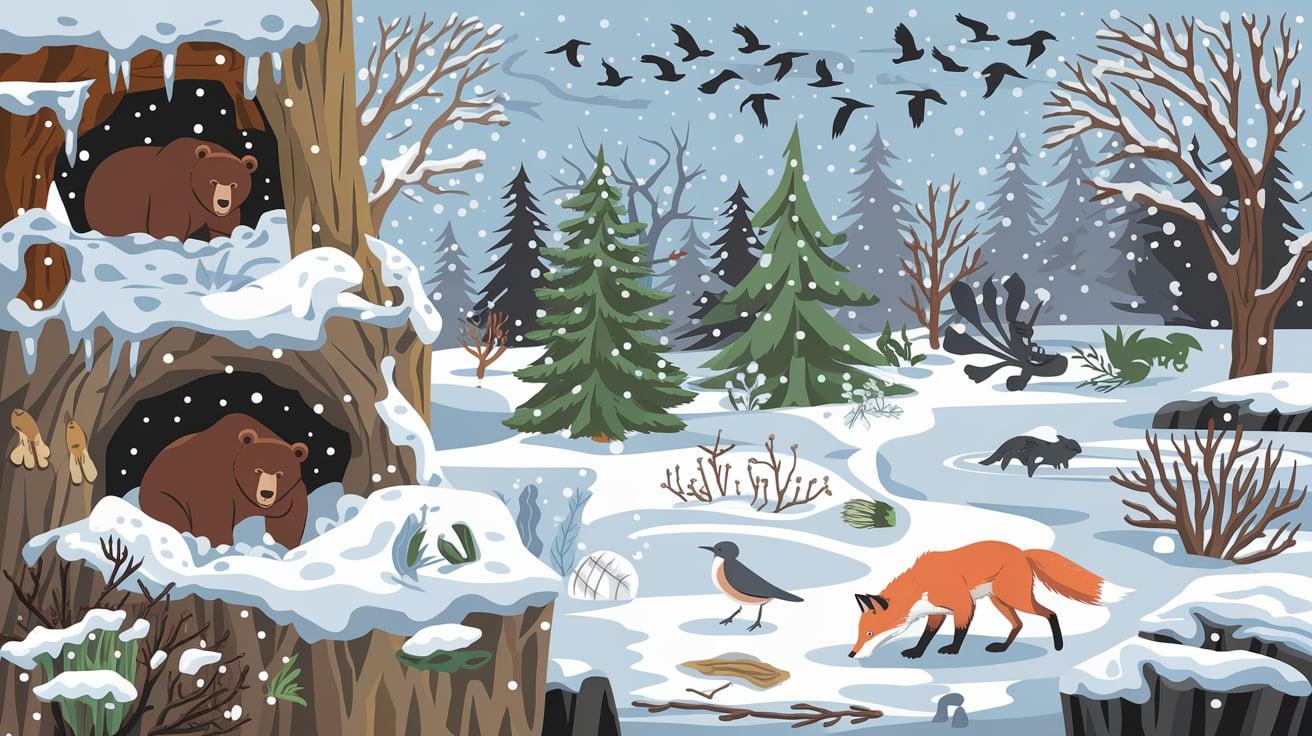183 Winter Trivia Questions to Enjoy This Cozy Season

Winter season shapes cultures worldwide. This collection of Winter trivia invites you to find the wonders of winter.
If you’re planning a party, teaching students, or simply curious about winter’s mysteries, these questions offer something for everyone.
The collection spans eight categories: Science of Winter, Winter in Nature, Winter Olympics & Sports, Winter Holidays Around the World, Winter Arts & Culture, Fun Winter Facts & Records, and Winter Food & Drink.
Use these questions sequentially for a comprehensive quiz, select specific categories for focused learning, or mix them to create custom trivia sessions.
Each question has been carefully chosen to both educate and entertain.
How to Use This Collection
Use these questions sequentially for a comprehensive quiz, select specific categories for focused learning, or mix them to create custom trivia sessions.
Each question has been carefully chosen to both educate and entertain.
The Science of Winter

Q1: At what temperature do snowflakes form?
A: 32°F (0°C) or below
Q2: How many sides does a snowflake have?
A: Six sides
Q3: What causes the Northern Lights to be seen in winter?
A: Solar particles hitting Earth’s atmosphere
Q4: What’s the coldest temperature ever recorded on Earth?
A: -128.6°F (-89.2°C) at Vostok Station, Antarctica
Q5: Why does salt melt ice on roads?
A: Salt lowers the freezing point of water
Q6: What percentage of Earth’s freshwater is stored in ice?
A: About 70%
Q7: What is a sun dog in the winter sky?
A: Bright spots beside the sun caused by ice crystals
Q8: What creates the pattern of frost on windows?
A: Water vapor freezing on cold glass
Q9: How fast do snowflakes fall?
A: 1-4 miles per hour
Q10: What is diamond dust?
A: Tiny ice crystals that float in the air
Q11: What makes snow crunch when you walk on it?
A: Ice crystals breaking under pressure
Q12: Can it be too cold to snow?
A: Yes, very cold air holds less moisture
Q13: What is a frost flower?
A: Ice formations that grow on plants
Q14: What shape are snow crystals?
A: Hexagonal (six-sided)
Q15: How many calories does shivering burn?
A: Up to 400 calories per hour
Q16: What causes the wind chill effect?
A: Heat loss from skin due to moving air
Q17: What is thundersnow?
A: Thunder and lightning during a snowstorm
Q18: How many inches of snow equal one inch of rain?
A: About 10 inches of snow equals 1 inch of rain
Q19: What’s the largest snowflake ever recorded?
A: 15 inches wide in Montana, 1887
Q20: Why is snow a good insulator?
A: It traps air between ice crystals
Q21: What is black ice?
A: Clear ice that looks like the road surface
Q22: How do ice crystals form in clouds?
A: Around tiny dust or salt particles
Q23: What makes some winters colder than others?
A: Changes in jet stream patterns
Q24: What is graupel?
A: Soft, small pellets of ice
Q25: How cold must it be for breath to freeze?
A: Below -40°F (-40°C)
Q26: What causes winter inversions?
A: Cold air trapped beneath warm air
Q27: What is hoarfrost?
A: Feathery frost formed on cold surfaces
Q28: How does snow reflect sound?
A: Fresh snow absorbs sound waves
Q29: What creates snow rollers?
A: Wind rolling snow into natural cylinders
Q30: What is virgin snow?
A: Undisturbed, fresh snowfall
Winter in Nature

Q31: How do bears prepare for winter sleep?
A: They eat extra food to build fat layers
Q32: Which birds stay north all winter?
A: Cardinals, chickadees, and nuthatches
Q33: How do trees survive winter?
A: They become dormant and stop growing
Q34: What color do Arctic foxes turn in winter?
A: White
Q35: How do fish survive in frozen ponds?
A: They slow down their metabolism
Q36: Which animal doesn’t hibernate but stays active?
A: Red foxes
Q37: How do penguins stay warm?
A: With thick feathers and body fat
Q38: What happens to pond frogs in winter?
A: They partially freeze but survive
Q39: How do squirrels find food in winter?
A: They remember where they buried nuts
Q40: Which butterfly migrates south for winter?
A: Monarch butterflies
Q41: How do moose stay warm?
A: Their fur has hollow hairs that trap heat
Q42: What do honeybees do in winter?
A: Form clusters and vibrate for warmth
Q43: How do evergreen trees stay green?
A: Special needles retain chlorophyll
Q44: What happens to chipmunks in winter?
A: They wake up to eat stored food
Q45: How do deer find food in snow?
A: They dig with their hooves
Q46: What color are snow algae?
A: Pink or red
Q47: How do Arctic hares change?
A: Their fur turns white
Q48: What do wolves do in winter?
A: Hunt in larger packs
Q49: How do snowshoe hares walk on snow?
A: Large feet spread their weight
Q50: What helps seals stay warm?
A: Thick blubber layer
Q51: How do winter birds find water?
A: They eat snow
Q52: What do beavers do in winter?
A: Live in lodges under ice
Q53: How do plants know when to go dormant?
A: Shorter days trigger changes
Q54: What helps reindeer see in snow?
A: Eyes that change color in winter
Q55: How do arctic plants survive?
A: By growing close to the ground
Winter Olympics & Sports

Q56: When were the first Winter Olympics?
A: 1924 in Chamonix, France
Q57: What was the first winter sport?
A: Skiing for transportation
Q58: Which country has won the most winter medals?
A: Norway
Q59: When did snowboarding join the Olympics?
A: 1998
Q60: What’s the longest ski jump record?
A: 832 feet
Q61: How fast do bobsleds go?
A: Up to 93 miles per hour
Q62: When was ice hockey added?
A: 1920
Q63: What’s the oldest winter sport?
A: Ice skating
Q64: Who invented the snowboard?
A: Sherman Poppen, 1965
Q65: First Olympic skating champion?
A: Ulrich Salchow, 1908
Q66: Fastest speed skiing record?
A: 158 mph
Q67: When did curling start?
A: 16th century Scotland
Q68: First artificial ice rink?
A: 1876, London
Q69: Who invented modern skis?
A: Sondre Norheim, 1850s
Q70: Longest ice hockey game?
A: 176 minutes, 1936
Q71: First woman Olympic ski jumper?
A: 2014, Carina Vogt
Q72: Most winter gold medals?
A: Marit Bjørgen, 15 medals
Q73: First Winter Paralympic Games?
A: 1976, Sweden
Q74: Coldest Winter Olympics?
A: 1994, Norway, -11°F
Q75: Most expensive Winter Olympics?
A: 2014, Sochi, $51 billion
Q76: First artificial snow Olympics?
A: 1980, Lake Placid
Q77: Youngest winter gold medalist?
A: Kim Yun-Mi, 13 years old
Q78: First Winter X Games?
A: 1997, Big Bear Lake
Q79: Fastest luge speed?
A: 96 mph
Q80: First figure skating jump?
A: Axel Paulsen, 1882
Q81: Longest ski run?
A: Vallée Blanche, 13.7 miles
Q82: First indoor ski slope?
A: 1927, Vienna
Q83: Most Olympic hosting city?
A: Lake Placid, twice
Q84: First snowmaking machine?
A: 1950, by Wayne Pierce
Q85: Highest winter sports venue?
A: Jade Dragon Snow Mountain, China
Winter Holidays Around the World

Q86: When did Christmas become a federal holiday?
A: 1870 in the United States
Q87: First artificial Christmas tree?
A: Germany, 1800s
Q88: What’s Sinterklaas?
A: Dutch Christmas tradition
Q89: When does Russian Christmas occur?
A: January 7th
Q90: How long is Hanukkah?
A: Eight days and nights
Q91: First electric Christmas lights?
A: 1882, Edward Johnson
Q92: What’s a Yule log
A: Traditional Christmas dessert/wooden log
Q93: Origin of candy canes?
A: Germany, 1670s
Q94: What’s Boxing Day?
A: December 26th Holiday
Q95: First Christmas card?
A: 1843, London
Q96: What’s Diwali?
A: Festival of Lights
Q97: Chinese New Year animal count?
A: 12 zodiac animals
Q98: What’s Krampus?
A: Alpine Christmas folk figure
Q99: First Christmas tree lights?
A: Martin Luther, 1600s
Q100: What’s St. Lucia Day?
A: Swedish light festival
Q101: Kwanzaa meaning?
A: “First fruits” in Swahili
Q102: Traditional Christmas flower?
A: Poinsettia
Q103: Origin of mistletoe tradition?
A: Norse mythology
Q104: What’s Three Kings Day?
A: January 6th celebration
Q105: First department store Santa?
A: 1890, Massachusetts
Q106: What’s Ded Moroz?
A: Russian Santa figure
Q107: Origin of stockings tradition?
A: St. Nicholas legend
Q108: Japanese Christmas food?
A: KFC chicken
Q109: What’s Las Posadas?
A: Mexican Christmas tradition
Q110: First Christmas tree market?
A: Riga, Latvia, 1510
Q111: What’s Hogmanay?
A: Scottish New Year
Q112: First Christmas postage stamp?
A: Canada, 1898
Q113: What’s Christkindlmarket?
A: German Christmas market
Q114: Origin of advent calendar?
A: Germany, 1900s
Q115: Filipino Christmas length?
A: September to January
Q116: First Christmas tree lights?
A: Candles in Germany
Q117: What’s Sankta Lucia?
A: Swedish celebration
Q118: Origin of Christmas crackers?
A: London, 1847
Q119: What’s Befana?
A: Italian Christmas witch
Q120: First artificial snow?
A: 1950s Hollywood
Winter Arts & Culture

Q121: Who wrote “The Snow Queen”?
A: Hans Christian Andersen
Q122: First snow globe?
A: Vienna, 1900
Q123: Composer of “Winter” concerto?
A: Vivaldi
Q124: First Christmas carol?
A: “Angels Hymn,” 129 AD
Q125: Who wrote “Snow-Bound”?
A: John Greenleaf Whittier
Q126: First “Nutcracker” ballet?
A: 1892, Russia
Q127: Famous winter painting?
A: “Hunters in Snow” by Bruegel
Q128: First winter photograph?
A: 1839, London
Q129: Who wrote “Stopping by Woods”?
A: Robert Frost
Q130: First ice sculpture?
A: China, 600s AD
Q131: First winter landscape?
A: Netherlandish, 1400s
Q132: Who wrote “The Snowman”?
A: Raymond Briggs
Q133: First winter movie?
A: 1908 French film
Q134: Famous winter symphony?
A: Tchaikovsky’s First
Q135: First ice music?
A: Norway, 2000
Q136: Who painted snowy Giverny?
A: Claude Monet
Q137: First winter radio show?
A: 1922, BBC
Q138: Famous winter poem?
A: “Snowflake” by Longfellow
Q139: First winter fashion show?
A: Paris, 1910
Q140: Who designed the first snow art?
A: Simon Beck, 2004
Q141: First winter festival?
A: Medieval Europe
Q142: Famous winter play?
A: “The Winter’s Tale”
Q143: First ice theater?
A: St. Petersburg, 1740
Q144: Who wrote winter haiku?
A: Matsuo Basho
Q145: First winter carnival?
A: Montreal, 1883
Fun Winter Facts & Records

Q146: Largest snowball fight?
A: 7,681 people, Seattle
Q147: Biggest snowman?
A: 122 feet tall, Maine
Q148: Longest ice cream bar?
A: 4,549 feet, China
Q149: Most snow angels?
A: 8,962 people, North Dakota
Q150: Largest ice maze?
A: 25,000 square feet, Buffalo
Q151: Longest snowball roll?
A: 1,234 feet, Austria
Q152: Most ice sculptures?
A: 2,022, China
Q153: What is the largest snow fort?
A: 200 feet wide, Finland
Q154: Most igloos built?
A: 1,387, Canada
Q155: Longest ski line?
A: 60 skiers
Q156: Biggest ice fishing event?
A: 2,800 people, Minnesota
Q157: Largest snow castle?
A: Finland, 65 feet high
Q158: Most snowmen in one place?
A: 2,036, Japan
Q159: Longest ice bridge?
A: 22 miles, Antarctica
Q160: Biggest winter festival?
A: Harbin, China
Q161: Most snow cleared?
A: 1,132 inches, Alaska
Q162: What is the largest ice rink?
A: 8.6 acres, Moscow
Q163: Most winter sports medals?
A: Norway, 368 medals
Q164: Longest snow tunnel?
A: 1,600 feet, Switzerland
Q165: Biggest snow labyrinth?
A: 2,789.11 square meters
Q166: Most ice lanterns?
A: 2,651 lanterns, China
Q167: Largest snowflake?
A: 15 inches wide, Montana
Q168: Longest winter festival?
A: 3 months, Canada
Winter Food & Drink

Q169: First hot chocolate?
A: Mayans, 2500 BC
Q170: Oldest winter soup?
A: Pea soup, 500 BC
Q171: First gingerbread house?
A: Germany, 1800s
Q172: Traditional winter drink?
A: Wassail, medieval times
Q173: First winter food festival?
A: Quebec, 1894
Q174: Oldest mulled wine?
A: Rome, 2nd century
Q175: First ice cream festival?
A: Italy, 1600s
Q176: Traditional winter bread?
A: German Stollen
Q177: First winter market food?
A: Roasted chestnuts
Q178: Oldest winter dessert?
A: Rice pudding
Q179: First frozen food?
A: Clarence Birdseye, 1923
Q180: Traditional winter spice?
A: Cinnamon
Q181: First winter candy?
A: Candy canes, 1670
Q182: What is the oldest hot drink?
A: Tea, 2737 BC
Q183: First winter ice cream?
A: China, 3000 BC
Conclusion
This collection of 183 winter trivia questions offers a rich mix of knowledge spanning science, nature, sports, celebrations, arts, records, and food.
These questions work well for many settings – from classroom activities to holiday parties and family gatherings.
You can use them as a complete quiz set or pick specific sections that match your group’s interests.
Print these questions for party games, save them on your phone for quick access, or use them to create custom quizzes.
Each section brings interesting facts about winter that can spark conversations and learning.
Share these questions with friends, use them in teaching, or test your winter knowledge.
They’re perfect for making winter gatherings fun and educational while learning about this fascinating season.






